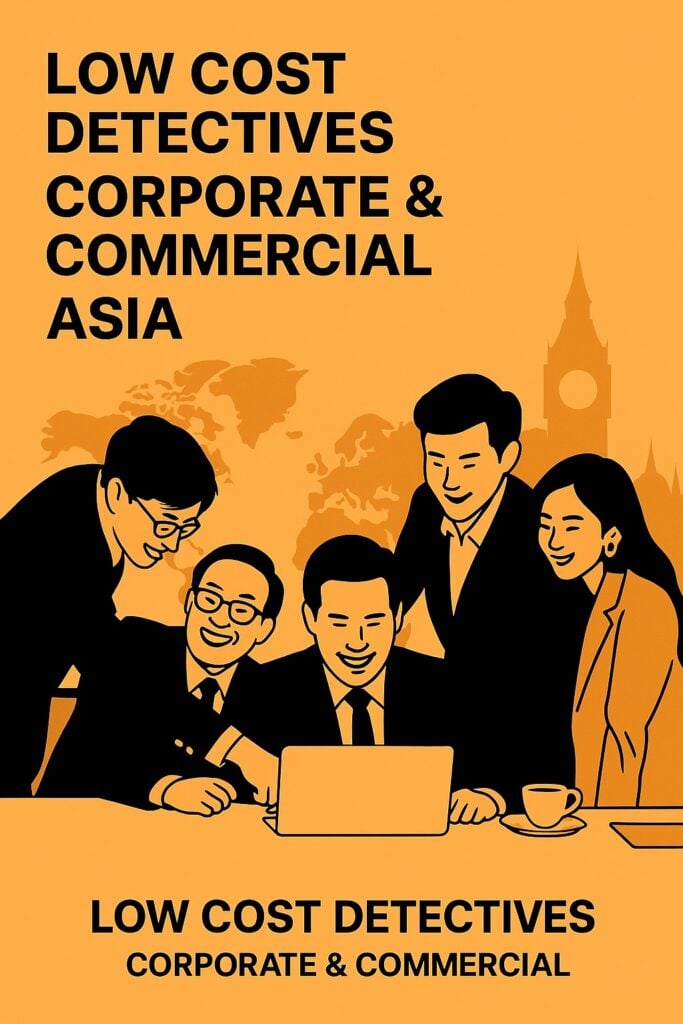- 63 – 66 Hatton Garden London, EC1N UK
Page Updated: 09.06.25
Low Cost Detectives Corporate & Commercial Investigation Service Asia
Low Cost Detectives Corporate & Commercial Asia. Safeguard your business interests with Asia’s most trusted corporate and commercial investigation agency. Low Cost Detectives delivers top-rated investigation services for companies in Singapore, Hong Kong, Tokyo, Bangkok, Kuala Lumpur, Jakarta, and across the region.
Whether you’re a business executive or company owner, you deserve to know exactly what’s happening inside your organisation. Don’t let employee misconduct, internal fraud, or competitor sabotage threaten your growth and reputation. Our expert investigators specialise in uncovering workplace issues, verifying staff integrity, and monitoring competitor activity. Providing clear, actionable intelligence to protect your business.
Contact us today for a confidential consultation and discover why leading companies across Asia trust Low Cost Detectives.

Get in Touch with our Expert Corporate & Commercial Detectives
Commercial Investigations concerns?
Corporate & Commercial Asia. These concerns could be anything. You may be worried about the constant absenteeism of a certain employee. Maybe you have noticed things have gone missing, and suspect theft. You could even find yourself a victim of fraudulent behaviour from someone within your company.
Sometimes, carrying out commercial investigations on your employees is needed. It is not about whether you trust them or not. It is all about making sure that your company is safe from any activity that may harm its performance. Our team can help you do this in a way that is ethical and will provide you with the information you so desperately seek.
Commercial Investigation Specialists Asia
Our commercial investigators are trained to carry out a range of services to get to the bottom of your problem. They have years of experience in corporate investigations and commit themselves to getting the answers you need. Each member of our commercial investigations team is given advanced training and support to ensure that they can successfully carry out their duties. High standard is always achieved by our team, even when faced with more arduous and complex assignments.
Corporate investigations can be completed for any type of business including commercial, industrial, legal and public sector companies.


Frequently Asked Questions About Corporate & Commercial Investigations in Asia
Please find a list below of frequently asked questions and answers
Low Cost Detectives provides a full suite of business investigation services, including employee absenteeism monitoring, internal theft and fraud detection, due diligence checks, competitor intelligence, asset tracing, and background screening. We serve businesses in major Asian markets such as Singapore, Hong Kong, Tokyo, Bangkok, Kuala Lumpur, and beyond.
Our investigators operate strictly within the legal frameworks and privacy regulations of each country, including China, India, Malaysia, Thailand, and the UAE. We use only ethical methods and ensure all evidence is collected lawfully, so your company’s interests and reputation are always protected.
Yes, we support organisations of all sizes, from startups and SMEs to multinational corporations and public sector bodies. Whether your business is in Vietnam, South Korea, Indonesia, or Japan, our experienced team adapts each investigation to your industry and specific needs, delivering clear and actionable results.
We combine local expertise with international standards, offering high-quality, confidential, and cost-effective investigations. Our team is known for advanced training, professionalism, and a strong track record of resolving complex cases for clients in diverse Asian markets.
To begin, contact us for a confidential consultation about your business concerns. We’ll design a tailored investigation plan, keep you updated throughout, and provide a detailed report with actionable findings. For pricing and available packages, please reach out directly so we can recommend the best solution for your location and requirements.
Corporate & Commercial Investigations Asia Interesting Links and Articles:
Chambers Asia-Pacific – Corporate Investigations & Anti-Corruption
A comprehensive guide to leading law firms and practitioners specializing in corporate investigations and anti-corruption across Asia. This resource provides insights into regulatory trends, enforcement actions, and best practices for commercial investigations in the region.
Lexology – Corporate Investigations in Asia: Key Legal and Practical Issues
An expert analysis of the legal landscape for corporate investigations in Asia, including compliance requirements, risk management, and practical steps for conducting internal investigations. The article highlights challenges unique to the Asian market and offers guidance for businesses facing commercial disputes or regulatory scrutiny.
International Tax Review – Best Practices on Corporate Investigations in an Interconnected World
This article explores best practices for conducting corporate and commercial investigations in Asia, with a focus on cross-border coordination, due diligence, and managing regulatory risks in an increasingly interconnected business environment.
Corporate & Commercial Investigations Asia – Afghanistan – Armenia – Azerbaijan – Bahrain – Bangladesh – Bhutan – Brunei – Cambodia – China – India – Indonesia – Iran – Iraq – Israel – Japan – Jordan – Kazakhstan – Kuwait – Kyrgyzstan – Laos – Lebanon – Malaysia – Maldives – Mongolia – Myanmar – Nepal – North Korea – Oman – Pakistan – Palestine – Philippines – Qatar – Russia – Saudi Arabia – Singapore – South Korea – Sri Lanka – Syria – Taiwan – Tajikistan – Thailand – Timor-Leste – Turkey – Turkmenistan – United Arab Emirates – Uzbekistan – Vietnam – Yemen



